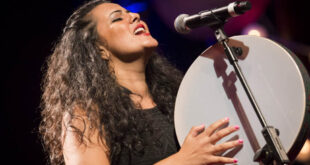Reprinted from Al Hayat, 7 November, 2004, p.21, with permission.

This year's Ramadan brings in its train, as usual, hundreds of serialized dramas, talk shows, and other standard format programs of the sort that increase year after year as a result of the burgeoning number of Arab satellite channels. What is new this year is represented in two controversial items, each of which links art and religion, and which have served to divide their audiences into supporters and opponents.
The first is the outlet provided for British-born Azerbaijani singer Sami Yusif (24 years), who has become a guest in Egyptian homes this month via the satellite music channels, which have made strenuous efforts to reduce the airing of songs not in keeping with the spirit of this holy period.
Yusif's religious songs have found wide acceptance and popularity among "hip" youth who are also religiously committed, especially since the songs, such as "The Teacher," "The Cave of Harra'," and "O Chosen One," mix English and Arabic, the latter pronounced by Yusif with a "broken" accent similar to that sometimes affected by members of the upper classes.
On the other hand, Yusif and his songs have met with fierce resistance within a number of media circles. Some of these object to a foreigner's daring to sing in Arabic when he does not have full command of the language, while others object merely for the sake of objecting.
Of particular interest is the fact that the works of Yusif, who studied at London's Royal Academy of Music, are distributed in Egypt by a media production and distribution company well known for marketing religious audiotapes of the sort sometimes characterized as "extremist."
Ramadan Almanac
The second item that has stirred interest is the Ramadan almanac broadcast by religious satellite channel Iqra' the under the title Ihna f- Ramadan (We're in Ramadan).
The central focus of the program is on the cartoons and drawings of artist Mohammad Sami, who introduces his work by saying, "Our art and media are a basic part of our culture and civilization, and were it not for a few mistakes in certain media and arts fields it wouldn't have occurred to anyone to ask the question, 'Is art right or wrong?'"
Translated by Humphrey Davies, TBS managing editor.
 Arab Media & Society The Arab Media Hub
Arab Media & Society The Arab Media Hub




